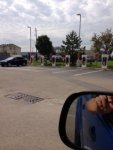I took a regular walk to the corner to see the outcome of another crash. I live near one of the more crash prone intersections in TO.
Had a chat with one of the fire fighters there doing clean up and discussed the risks of electrical explosions. He indicated they have no set procedure for dealing with EV's. The jaws of life could be jaws of death. I'm sure there is a procedure but he wasn't aware of it other than a main disconnect supposedly in the trunk (Possibly under all the household junk and groceries)
There is training for first responders - you can read about it here:
http://www.oafc.on.ca/system/files/...ybrid Electric Vehicles FINAL August 2015.pdf
If that officer in particular didn't receive it something failed along the chain somewhere.
Regardless, most EV's (including the Volt) do have automatic crash systems that disabled the high voltage systems as close to the battery as possible, and under the hood on many (most?) EV's there are emergency response diagrams that tell first responders how to safely cut the HV wires and such if possible/needed, where they are routed, etc. It's certainly an issue that has been thought of.
Employers resisting paying for electrical usage at work:
My accountant figures they lose an hour per day per employee due to employee net surfing so the hydro costs just become another perk like free coffee and internet. That is if the usage is minimal but if we all go EV and the employer has to put in megabucks of wiring and upgrades it's a new ball game.
Re the condo lady getting her circuit disconnected:
I don't know if the board was being narrow minded or forward thinking. If she had approached the board and they agreed to allow her to plug in it could have been treated as a one off experiment to study future considerations. An unfavourable result could have been covered to minimize costs to everyone if things didn't work out.
If they allow Mrs. Jones to plug in how do they say no to Mr. Smith and a few hundred others.
Places better start to be more forward thinking, ESPECIALLY apartment buildings/condos. EV's are the way of the future, to deny that is to be in the horse and buggy crowd discounting the "new fangled automobile" as a fad that'll never catch on.
Places where people live are going to have to get up to speed eventually - failure to do so will result in people just living elsewhere which will result in vacancies, and eventually it's a foregone conclusion that when EV's reach a critical mass, if building owners don't take actions on their own to provide charging infrastructure the government will mandate it.
The forward thinking owners are already thinking about it. Places like that condo with their heads stuck in their own butts are going to eventually be told instead of asked, or they're going to miss out on quality tennants because they'll just go elsewhere when they're told that EV charging is prohibited. It's already happening. It will only get more common.
The block heater, even if on its own 15 amp breaker and drawing 4-5 amps still leads back to a panel and building transformer that has to carry the load. One vehicle drawing an extra 6-7 amps wouldn't cause much of a problem but some garages here have over 400 cars. That could put an extra 200 Kw load on the building transformer and the general hydro network. At what point does the straw break the camels back?
Also the block heaters only get used in the winter but Ev's use power all year. Some load capacities are seasonally shared because one doesn't tend to run electric snow melting and electric outdoor pool heat at the same time.[/QUOTE]
Although those are pretty forward-looking numbers they are certainly not unattainable with proper forethought at the time of construction or renovations. The reality is is that 20 years from now probably between 50-75% of people are going to expect an EV charger at their parking spot in condominiums or apartments. Even ICE vehicles that me be around still (such as those with large ICE pick up trucks for pulling/towing) will still probably want them as I strongly suspect as time goes on even those will have an EV portion of propulsion like the Volt does now - EV for grocery getter duty ( which face it, is 98% of a typical pick-up trucks life) and ICE for towing/range extension
Times are changing. Sticking ones head in the sand as a building owner will just end up costing them more in the long run.


















